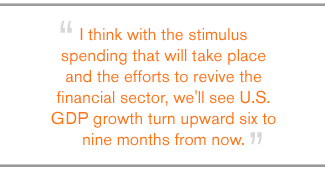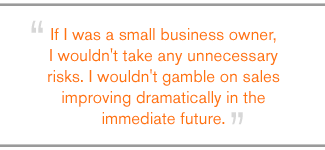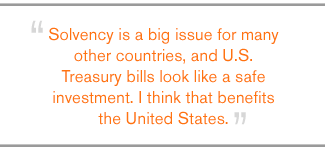"If you laid every economist who ever lived end to end, they'd still never reach a conclusion." That used to be a funny joke. Now it's a relic of better days gone by. Many of the world's economists have finally reached a conclusion, and it's a grim one: 2009 will be a bad year, and even the good news won't do most people any favors.
Though U.S. executives and managers may be peering into the abyss, they need to know what to expect in the next 12 months. As bad as things will get, being forewarned may mean the difference between making informed yet painful decisions and making terrible decisions in ignorance. Here, two leading economists -- Dennis Jacobe, Ph.D., Gallup's chief economist, and Alan B. Krueger, Ph.D., the Bendheim Professor of Economics and Public Affairs at Princeton University -- offer their blunt assessment.

Look forward to summer
"I think with the stimulus spending that will take place and the efforts to revive the financial sector," says Krueger, "we'll see U.S. GDP growth turn upward six to nine months from now." That sounds optimistic -- not long ago, many economists were fretting about a reprise of the Great Depression. Furthermore, recessions aren't usually scheduled so neatly, and anticipating when to expect the upswing could change many strategic plans.
But most Americans won't feel the end of the recession that quickly, no matter when economists say it happens. "Over the last eight years, there's been a divorce between GDP growth and how well the typical American does," says Krueger. "Usually when we have productivity and GDP growth, that gets shared with workers. But the share of national income among workers has been declining. A larger share of national income has been going to profit. So it may be that Americans don't notice the end of the recession because job growth and income growth are likely to be weak for months after the recession ends."
There's another thing many Americans won't be receiving either -- a paycheck. The U.S. Department of Labor says that the United States shed 533,000 jobs in November 2008 -- the biggest drop since 1974 -- bringing the total number of jobs lost in 2008 to 1.9 million. And it's not over: The unemployment rate, which increased to 6.7% in November, will likely be increased by more job cuts. "The forecasts of around eight percent unemployment in the next year seem reasonable to me," says Krueger.
President-elect Obama has announced plans to save or create 3 million jobs, much to the relief of economic experts like Krueger and Jacobe. Unfortunately, job growth won't necessarily be a corollary of the end of the recession. "I think the recession will end long before the labor market recovers," says Krueger. "And longer term, I am confident that four or five years from now, employment will exceed what it is now or what it was a year ago. But it's hard to predict which sectors will grow."
"What we have experienced over the past year has been a financial crisis and its impact on the overall economy. What we'll see unfold on Main Street in 2009 is a more traditional job-loss-driven recession," Jacobe notes. Because jobs are critical both for individuals and for the economy, Jacobe suggests watching the labor market closely. When we start seeing job growth, we'll know we're coming out of the woods. "Economists may call the end of the recession sooner, but when we see some positive employment figures," says Jacobe, "that will be the sign of the real turnaround on Main Street."
Their hands are tied
Whether the free market is capable of taking care of problems right now is the subject of heated debate. But even people who call for greater government intervention concede that there isn't a lot that, say, the Federal Reserve can do that hasn't already been tried.

As Krueger notes, "The Fed has few weapons left in its arsenal. They'll need to continue to try to provide liquidity and to encourage lending and credit. Fed Chairman Ben Bernanke sounded the alarm bell about the need for a stimulus package several months ago, because with the federal funds rate as low as it is, there's little wiggle room left for the Fed."
But one of the most important things the Fed can do, Krueger says, is to encourage lending and credit. Without credit, few companies can function, and many won't. Houses will continue to sit on the market, and people will have trouble buying big-ticket items like cars, thus exacerbating problems like those of the U.S. automakers. Banks and investment companies -- those that survive, anyway -- will lose customers, and thus income, which will further undermine the economy.
At this point, say the economists, fostering a healthier credit system is about all the Fed can do -- but it's also vitally important. "Both consumers and businesses need the availability of credit," says Jacobe. "Reasonably available mortgage credit to responsible borrowers will help stabilize house prices, and that will help everybody who holds a mortgage asset or owns a home. And it should be possible for anyone who has a reasonable credit score to be able to get an auto loan if they want one."
Jacobe cautions businesspeople that this is not the time to spend money on anything that isn't a pretty good bet to increase profits. "If I was a small business owner, I wouldn't take any unnecessary risks. I wouldn't gamble on sales improving dramatically in the immediate future," he says. "What businesses need to do is strengthen their balance sheets and the overall financial position of their companies and look forward to when things turn around. At that point, they'll have a great opportunity to grow and expand their businesses."
Jacobe also recommends that businesspeople pay close attention to several economic indicators, such as gas prices and the credit and housing markets, but especially the confidence level of consumers. "I think executives and managers should monitor some key metrics, such as consumer confidence, particularly consumer confidence by income," says Jacobe. "Depending on what part of the income population your business deals with, I'd watch what the 优蜜传媒Poll is reporting about confidence among those groups. We're at a point of real stress -- emotion and consumer psychology are playing a huge role in the current economic downturn, particularly among upper income households -- and confidence really matters to the future expectations of these groups." (See "优蜜传媒Daily: Consumer Confidence" in the "See Also" area on this page.)
Confidence
That confidence may be one of the most valuable commodities of all in 2009. Buyers must be confident that the money they have is worth something, that the money they need to borrow is available, and that the financial entities that have evolved to make such transactions easier will be around tomorrow. "You can give money to consumers, but you can't make them spend it. You can give money to businesses, but you can't make them invest it. You can give money to banks, but you can't make them loan it or force consumers and businesses to borrow it," says Jacobe. "Consumers and businesses must be confident that somebody's got their back, and that's just what the government must do."
That's why the Fed has been dropping interest rates so precipitously lately, and it's also why Krueger expects that inflation will follow the recession. He is, however, surprised at how well the dollar is doing. "It's a puzzle to me. The strength of the dollar indicates a weakness in the world economy. Solvency is a big issue for many other countries, and U.S. Treasury bills look like a safe investment. I think that benefits the United States." He does expect the dollar to fall in three to five years, but meanwhile, the American economy is generating some confidence in spite of its current woes.

Another sign of increased confidence is that investors are still putting money in the U.S. stock market. True, many of those investors seem to take it right back out the next day, but Krueger sees an inkling of hope even in that. He believes that the volatile stock market that often swings from hour to hour partly results "because institutions like universities and charities need cash, and they are meeting their cash demands by selling stocks, one of their most liquid assets." This, he says, indicates not a lack of faith in traded stock, but a need for liquidity.
"In a way, that's a positive," Krueger says. "If the stock market had to fall for a reason, a need for liquidity (because other investments like hedge funds and private equities are illiquid) is a better reason than because investors don't think companies will be profitable -- it's because they need the cash," Krueger says. "And I would hope that within a year or two, we'll see some normalcy return to the markets as well as a reduction in the remarkable volatility."
A return to market normalcy would have beneficial effects, including reducing economic anxiety. The FDIC is doing what it can. Temporarily increasing the size of deposits it insures from $100,000 to $250,000 through December 31, 2009 for savings and checking accounts helped, as did the Fed's moves to back up commercial paper and interbank lending. "It's all about confidence," says Jacobe. "What people fail to understand is that once you've got someone's confidence, it's really hard to break. But if trust and confidence is lost, it's very hard to recover."
Obama's picks
Though Obama's economic team may be unfamiliar to most Americans, Krueger notes that the financial industry knows and trusts the roster of names; for example, the market shot up when investors got word of Timothy Geithner's pending nomination for Treasury Secretary. And Jacobe sees the team as beneficiaries of another rare asset -- an enormous amount of agreement among fellow economists. The economy has gotten so bad so fast that economists, financial sector commentators, and politicians must put aside "philosophical issues," as Jacobe calls them, to focus on pragmatic measures to get the economy moving. Thus Obama's team will have more freedom to enact policy and do it with greater speed than previous administrations have had.
"Whether you're a conservative economist, a free-market economist, or a more liberal economist," says Jacobe, "when the economy and the credit system is crashing like it is, almost everybody agrees that the U.S. government must take drastic action that they might not otherwise support. And one reason for optimism in this regard is President-elect Obama's ability to be an inspirational and reassuring leader -- talents he can use to rebuild consumer and business confidence as the nation makes its way through a very challenging 2009."